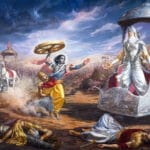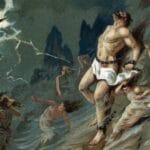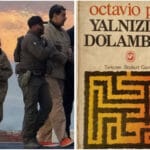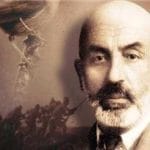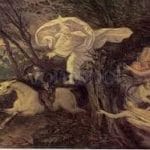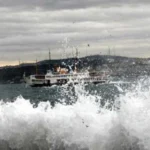In ancient China, there was a mountain near a village. Inside the mountain lived a dragon. The villagers, fearful of the dragon’s malice, would send him gifts every year without fail. From time to time, a brave young man from the village would set out, take up his sword, and declare he would slay the dragon. Yet many such heroes went—and none ever returned.
As time passed, another young man emerged, braver than all before him, whose fame had spread across the entire region. He too intended to destroy the dragon. His relatives and friends tried hard to dissuade him, reminding him often that none who had gone before had returned—but it was all in vain.
The young hero gathered his provisions and sword and set out. Upon reaching the mountain, he soon found the dragon’s lair, drew his sword, and entered. After advancing a short way inside, the terrifying dragon suddenly appeared before him. The young man did not lose his composure. He began striking the dragon with all his might, skillfully parrying its attacks. The fight ended shortly thereafter with the dragon’s death. The cave echoed with the young man’s cry of victory.
The young man, filled with excitement, stepped forward and began to explore the cave. He discovered a dazzling treasure, and naturally, he also saw the bones of many victims scattered around. Yet something caught his attention—among these bones, there were no human remains.
He could not make sense of it. After all, so many brave men had come to this mountain over the years to face the dragon, and none had ever returned. But the bones lying right there before him were so large that they could only have belonged to animals. Right then and there, it happened.
The young man began to tremble. Looking at the hand that held his sword, he was in utter horror to see coarse hair covering his skin, his nails growing long and sharp, and his clothes—already too tight—ripping apart. He tried to scream, but only a terrible growl escaped his mouth. For he had turned into a dragon.
In any situation dominated by absolute convictions and prejudices, truth is left without an owner. When individuals and communities turn their identities into idols, all that is left to do is to attack the idols of others. Yet truth is not to be found in any of these idols—it lies in the rejection of idolatry itself. For this reason, we must no longer focus on the sides shaped and driven by this or that struggle, but instead lay bare the ancient problems of our very existence.
Because we have not reckoned with our great defeat in World War I—a defeat that the Republic postponed and buried—and especially because we cannot stomach our submission to the victors yet also do not dare to defeat them, we have never been able to love the regime that embodies this contradiction. As a result, we circle endlessly around every issue without ever reaching its core. This dynamic, like the aftershocks of a great rupture, tears society apart psychologically and easily drives people into hostility toward one another. And, as always, it is the state—or more precisely, the state-like structure that replaced the Ottoman Empire—that stands at the head of the problem. It is the first to shed blood, the first to commit crimes, and those who set out to defeat it end up imitating it. Thus, crime and bloodshed never cease.
This, indeed, must be the hidden wisdom of the Chinese tale. Some among us are perpetually trying to save us, yet the dragon never dies. For that dragon is us, and the stalwart young saviors who rise from among us carry within themselves the very monster that exists in all of us. Our recent history is full of examples of this same paradox of salvation—chiefly the CHP and the army, who became monsters in the name of “saving the homeland” and establishing a new, independent, modern state, and continuing with the opposition groups and organizations that set out to get rid of them, took to the mountains, or went to Ankara, only to reproduce the same pattern.
Even the privileged and authoritarian demeanor of those who seized state power in the 1920s can, in the final analysis, serve as a role model for those who fought against them. Looking at the religious, leftist, and ethnic structures produced by the old order of Türkiye, one finds demands for privilege and hegemony that, while appearing very different both within and among them, in fact spring from the same mold. For example, organizations such as the Camia and the PKK—both products of the September 12 coup—seem to have become poor imitations of the Kemalist elite’s style of lording over society.
What Remains After the Great Defeat
A philosopher once said there is only one explanation for why people worship cows in India: hunger! In Türkiye, there is probably only one explanation for why people turn to ideological structures in search of salvation: our great defeat against the West. That great defeat we could not overcome, could not face, could not deal with, and could not avenge. Perhaps that is why we choose only each other as the enemy to defeat.
Kemalism—the ardent acceptance of our great defeat against the West and the new state’s effort to shape society accordingly—is also the source of our religious and ethnic problems. For it embodies the unforgivable crime of dividing society at its very core and in its very essence in order to avoid being divided again, and then attempting to resemble the very infidel against whom our forefathers fought the War of Independence. This crime was committed by secularizing the concept of “Turk” and elevating it to the status of a god for a tribal structure disguised as a nation-state—a form of hidden colonialism. Confronted with the unassailable power of the state, society’s only recourse was to avoid direct conflict, to “walk around the bush rather than wrestle with the dog.” The operation to corrupt the notion of nationhood and fabricate a nation from it further devastated a people already struggling to survive amid the ruins of a corrupted and collapsed ancient order.
As a result, many heroic saviors arose, resting their legitimacy on the righteousness of opposing this devastation. These were structures that sanctified their existence with a kind of Mahdi–Messiah mission, granting themselves an unassailable, unquestionable, unchangeable, and unaccountable privilege; never questioning their absolute convictions; treating their judgments and criticisms not as ideas to be shared with society, but as fuel to fortify their own existence; and seeking to become the new masters of victims—whether on ethnic or religious grounds—who had been beaten by the state. Each draws crowds with dreams of an imaginary future that never arrives, and the only way they can sustain themselves is through a narcissistic self-worship. Every one of them has drifted from its founding purpose, even become alienated from the very people they claim to save, yet tries to stay afloat through exaggerated legends and epics that portray them as indispensable. In practice, they have become nothing more than companies or Masonic machines of solidarity and belonging, and taken together they are clones of the old state and its elites, sharing the same traits. In the end, the two main characteristics of Kemalism—nationalism and positivism—continue to survive through these structures.
Truth is divine and is present everywhere and in everyone. The state, like truth, is legitimate only so long as it belongs to everyone. Kemalism has run its course because it both tried to embellish truth with lies and set itself up as lord over society, and because it stripped the state from being everyone’s and turned it into the guardian of those who think and live in a Western-minded way. Now, in the final moments of this exhaustion, we are watching the death throes of the copies Kemalism produced. Those who impose themselves with lies, falsehoods, and a haughty tone obscure the truth and exploit our suffering.
The reason behind humanity’s ancient corruption—worshipping another power alongside Allah—is that people subject themselves and one another to such powers, feeling helpless, miserable, and powerless, and imagining that there is power in things other than Allah—authority, weapons, money, intelligence, knowledge, science. Yet what this voluntary servitude fails to grasp is that what they imagine to be power is merely a reflection of their own powerlessness. And that powerlessness always stems from their own fears, laziness, or ignorance.
As a society, while trying to break free from the false order built by fake saviors who feed on this sense of powerlessness, we are also being tested by the inadequate ambitions of many pied pipers who have set themselves up as rescuers before them. They impose the nationalist, positivist, and pagan attributes of the Western paradigm on society and the state as if these were indispensable, absolute, and unquestionable truths, and through them they seek to make people victims of false struggles and cheap, easy hostilities. As a result, ordinary political or legal issues turn into blood feuds; certain concepts are enthroned as taboos and treated as idols to be worshipped as someone else’s fetish; and simple political differences explode into the draining, consuming energy of hatred and revenge. The majority of society, who wish to endure the great defeat with patience and forbearance and to see at least a little peace, are now being dragged from one conflict to another, from one polarization to the next—while rotting from within.
The Test of FETÖ or “The Cemaat”
As Türkiye turns inward and attempts, like a phoenix, to rise from its ashes and return to where it left off in 1914 with its true state, homeland, and society, these abnormal reflexes will naturally diminish. Yet those who, under the circumstances of the old Türkiye, climbed aboard the Trojan horse they had built to conceal their “noble” aims and their own existence from the state, and set out to take over and subjugate the state and society, are reproducing yet another abnormality. With their savior complex, they impose a bill on both society and the state.
The Fetullah Gülen group (FETÖ), which began in the compelled circumstances of the old Türkiye as an Islamic community and transformed into an international postmodern network, is not exempt from this. As the debate over private tutoring centers has shown, the strange polarization that spread from a simple educational issue to Türkiye’s administrative, legal, and political structure and its international policies points to a deeper problem: as the conditions that gave rise to this messianic savior impulse change, the saviors and their paths to salvation insist on imposing themselves as replacements for the old order. The psychology of Mehdiyet (Mahdism) that attributes unquestionable divinity to everything it does without any self-examination sees itself as entitled to intervene in Türkiye’s national and international existential issues and policies. This stance, which has shaken public trust in the reputation and mission of this community and raised suspicions that it is a subcontractor for global operations, has made this organization a party to political conflicts.
For an organization that grew by relying on the virtue of caring for other people’s children, it was expected to correctly interpret the credit society extended for this “good effort” and to continue along the same path. Yet the organization—especially through the words of some of its spokespeople—used warlike language full of insults and threats against Islamists, Erdoğan, and anyone who did not think like them, thereby destroying its style of warmth and affection and wounding the perception of innocence it had built up over the years. FETÖ, by its own hand, has effectively ended its own existence. At its core, it was the subcontractor of a malign intent: to seize control of the country as the new self-colonizing cadre for Western powers. And this satanic scheme, carried out behind the mask of goodness, innocence, and charitable activities, was shattered by the common sense of the people. Allah grants respite in this world to oppressors and disbelievers, but He does not wait for the hereafter to punish those who commit satanic deeds in the name of Allah and in the name of the values of goodness and truth; He humiliates and disgraces them in this world as well.
Yet building a state and society in which such situations would never arise in the first place is a far less costly path than engaging in politics and waging a legitimate struggle, just like any ordinary citizen. To reach paradise, there is no need to rule the world, to have fanatical followers, to seek wealth, positions of power, or lofty and grand ambitions. These are the paths of the faithless, not of the faithful. The Holy Qur’an describes the way to paradise, and our ordinary mothers and fathers—whose lives have been marked by hardship—have been able to walk that path without ever needing such great missions, simply by living modest, humble, unassuming lives as good people. Anyone who wishes to be more Turkish, more Kurdish, more devout, more modern, freer, more republican, or more democratic must first learn the ethic of not imposing oneself upon the state or upon others, not forcing others to become oneself, and not seeking to compel people to submit to the power one has or wishes to have. No sacred goal can ever be reached through such immorality.
And of course, the state must be the first to embrace this morality. It must recognize that it has been a bad enough example for society, humble itself by kissing the hands of ordinary people and learning something from them, and thus overcome its arrogance. Perhaps then we will realize that the dragon we imagined was tormenting us does not actually exist—that there is no need to seize control of the state, to establish a separate state, or to worship sanctified idols and drive people into futile conflicts.
And perhaps, by abandoning false causes and fake divisions, and by embracing our truly noble struggle—the virtue of La ilahe illallah, that is, rejecting systems of servitude to anything other than Allah—we will set out on the true path of salvation and turn toward the unfinished reckonings that have long been left unresolved. In this way, the children of Abraham will go to the lairs of the global demons that have plagued humanity and Islam, and hang their axes upon the great idol found there. Only then will we attain the genuine peace we are in need of. The rest, indeed, is meaningless…
2016-haber10.com

